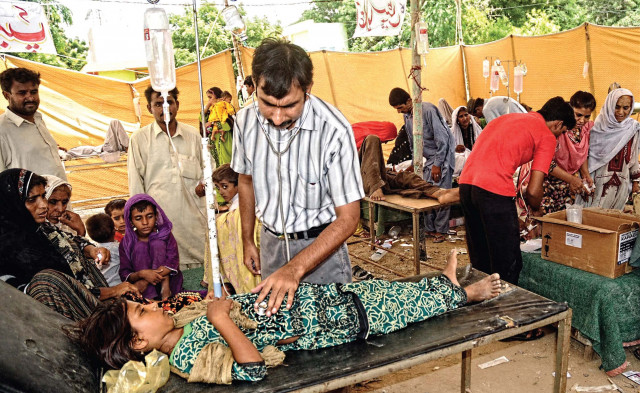Weather swings trigger seasonal illnesses
Medics urge citizens to dress in layers, stay hydrated and take preventive care

As Islamabad shifts from summer's fading heat to an early winter chill, residents are struggling to adjust to the city's unpredictable temperature swings. Warm afternoons quickly give way to chilly evenings, leaving citizens unsure how to dress, plan their days, or protect their health.
Doctors report a steady rise in seasonal ailments ranging from flu and sore throats to skin dryness and allergies, as the fluctuating weather challenges the body's ability to adapt. After weeks of lingering warmth, cool winds have finally arrived in the capital — but the relief comes with discomfort.
During the day, Islamabad remains mild and sunny, while evenings and early mornings bring a sharp drop in temperature. "I love this time of year, but it's confusing," said Farah Khan, a resident of G-9. "It's cold when my children leave for school, hot when they return, and they keep catching colds because of the constant change."
University students are facing the same dilemma. "We never know what to wear," said Sidra Zahra, a student at a local university. "It's sweater weather in the morning, summer by noon, and freezing again at night. I end up carrying half my wardrobe around."
Medical experts say the rapid shifts in temperature are behind a surge in respiratory infections. "When days are warm and nights are cold, the body's internal system struggles to adjust," said Dr Imran Hassan of the Pakistan Institute of Medical Sciences (PIMS). "Without proper care, immunity drops, making people more vulnerable to flu, cough, and asthma."
He added that dry air is also triggering skin problems such as itching, flaking, and eczema flare-ups. "People should start moisturizing early, avoid hot showers, and drink plenty of water as humidity falls sharply," Dr Hassan advised.
Outdoor workers are among those worst affected. "It's too hot for a jacket during the day but too cold without one at night," said taxi driver Muhammad Rizwan. "I've already caught the flu twice this month. The dry air also makes my hands rough and itchy — it's tough working like this."
According to the Pakistan Meteorological Department, such abrupt changes are becoming more common due to shrinking transitional seasons and the impacts of climate change, deforestation, and air pollution.
Health professionals urge residents to protect themselves by wearing layered clothing, staying hydrated, and eating a vitamin-rich diet to strengthen immunity. "The weather's beauty can be deceptive," Dr Hassan cautioned. "These rapid shifts are not just a sign of seasonal change — they're a growing public health concern."



















COMMENTS
Comments are moderated and generally will be posted if they are on-topic and not abusive.
For more information, please see our Comments FAQ